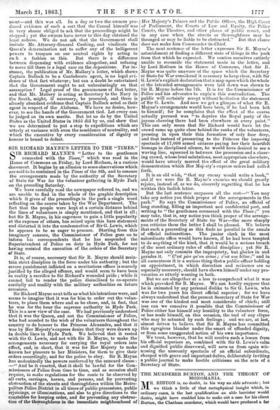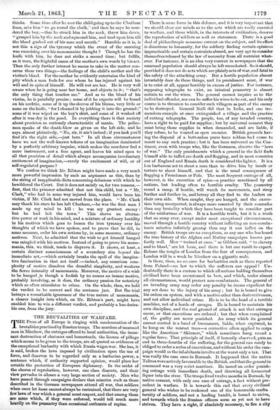THE MURDERER BURTON, AND THE THEORY OF MONOMANIA.
MR. RD3TON is, no doubt, in his way an able advocate ; but we think a little of that metaphysical insight which, in ordinary cases, is the last qualification an able barrister would desire, might have enabled him to make out a case for his client Burton, the Chatham murderer, which would have produced a far deeper impression on the Court than he succeeded in producing, though, perhaps, not a better result for the great ends of justice When the counsel, falling into the hacknied train of ideas belong- ing to this department of jurisprudence, strove to make out a case for the presence of illusions or delusions in the mind of the prisoner, he not only wholly failed, but diverted the attention of the jury from the only line of considerations which would have tended at least to exonerate his client from the moral responsibility of ordinary men. As we are not counsel for the prisoner, we will admit at once that on the whole evidence we regard the verdict as sound, and Mr. Justice Wightman's sentence as the only one consistent with the demands of that large view of our penal code which will not admit of its relaxation on any merely presumptive or probable grounds. But having made this admission, we think it may be interesting to point out how very much more powerful a case might have been made for the prisoner by an advocate with a distinct grasp of the nature of monomania than was actually made by Mr. Ribton.
Monomania need not involve any vestige of liability to illu- sion or delusion. It is, on the contrary, the monopoly of the mind either by a single thought or a single impulse, which thought or impulse, though not necessarily alien to any healthy mind, yet would, in sane people, be alternated freely with a variety of other qualifying influences, instead of stretching its dreadful monotony over the whole horizon of the character, and excluding the salutary equipoise of counteracting anddiverthfying tendencies. For example, a man's intellect might be so absolutely absorbed by a perfectly true though very narrow impression—say, for example, the unlimited services of steam to the human race—that he is for all intents and purposes a monomaniac, an intellectual boiler ( without a safety-valve), and nothing else. Such a man, horsed on his one idea, would ride rampant over all the feelings or thoughts of his saner neighbours, and though possessed by a thought true in itself, would, in conse- quence of being possessed by it instead of possessing it, exhibit all the symptoms of mentarderangement. The inability to appreciate the ordinary influence of ordinary ideas, in consequence of any fatal prepossession, is quite as genuine a form of insanity as the liability to completely false impressions. The man who cannot see the post before him for fanatical gazing at the ground or the sky, is quite as unable to govern his own movements as the man who does see a non-existent lion in his path. This kind of monomania has, how- ever, no bearing on the enge of the prisoner Burton. But there is another equally genuine case. The understanding may be tolerably open, and yet a single impulse get exclusive possession of the will in the same absorbing and pre-occupying fashion. For example, almost all sane men understand the destructive impulse. There are probably few living people who do not at times feel an unreasonable desire to commit some mischief, to clear a space round them in the world,—to sacrifice some other person or thing merely to the irritation which its (apparently) inopportune exist- ence excites in them. The man who, after losing heavily at a gambling-house, found a person tying his shoe calmly at the top of the stairs, and kicked him down, with the unfair observation, "Damn you, you are always tying your shoe," is merely a repre- sentative of the unreasonable access of destructive spite which is apt at times to come upon all men. But then, in all sane men, these sudden impulses, however powerful, never, in fact, ob- literate, though they may throw into the shadow, the traces of other and better impulses. In a sane mitrderer, pity, or shame, or awe, or gratitude, or some other impulse of human nature, will compete with the destructive impulse, and, so to say, give the better will a chance to assert itself, and throw its weight into the better scale. But in a monomaniac this will not be so. The one impulse which takes the command fairly gets its head, and leaves no room, even for the pleading of any other, till it is satiated. No one, we suppose, regards the famishing tiger, with the scent of its prey in its nostrils, as a free agent to refuse or yield to the impulse which bids it spring ; one appetite, and one only, occupies the whole area of its nature ; and it is, therefore, the type of a monomaniac murderer. Now, when such a condition of mind as this can be proved to exist in a man without criminal antecedents, —in other words, if you can show that it is due, not to a selfish or habitual indulgence of passion, but to an abnormal structure of character rendering it, from constitutional and non-moral causes, liable to these vibrating monotones of unexpectedand almost unintelligible feeling, then you prove monomania. Of course, a man may be responsible for bursts of really uncontrollable passion, because, even if uncontrollable, they represent a character habitu- ally ungoverned where it might have been governed, and if it had, would have been controllable in the final trial. And to prove
monomania, therefore, you must show not merely-an absolutely I mono. polizing impulse ; but also one which does not follow the ordinary laws of moral consequence, which is arbitrary and purposeless, not a product of self-indulgence, but a caprice of moral organization.
Now, it seems to us that at least an exceedingly plausible, though not, we think, a true account, of Robert Alexander Burton's crime might be given, which would exactly square with this description of monomania. We will mention later the symptoms which seem inconsistent with the theory, and at present only narrate the case as the counsel for the prisoner might have narrated it, if he had grasped the strongest points of his case. Here is the son of a mother who bad twice attempted suicide, and both times been re- moved to a lunatic asylum to restrain her,—the brother of one wh'o is considered silly, and " answers in monosyllables;" but who is him- self held to be intelligent and even clever. The master to whom he had been apprenticed in 1859 had deposed to his striking caprices of behaviour : "Very often he would drop his tools, run out of the shop, and pass backwards and forwards as if absent in mind ; when told to do anything he would often run about looking up to the sky as if he were a maniac :"—but beyond this nothing had transpired till the murder itself to indicate liability to monomania. The incident of the cat-pie so injudiciously drawn attention to by the counsel for the defence, not only has no hearing on the subject, but, so far as it goes, only proves that at the time it occurred the lad's nature was like, instead of unlike, that of the majority of hisclass and age. Latent tendencies to monomania, however, if really hereditary, often appear decisively for the first time about the prisoner's age, eighteen,—and the meagreness of the previous evidence, therefore, ought not to weigh too much against him. Now what are the circumstances of the murder ? First, it is clear that no selfish, interested, or natural motive of any sort, had anything to do with the selection of the victim. It is admitted on all hands that caprice or opportunity, or some trivial accident in the links of mental association, alone determined the choice of the victim. The child killed was "ten years of age, a cheerful little fellow, always singing." "I had not any particular ill-feeling against the boy," said the prisoner, "but I had made up my mind to kill somebody. I knew the boy, and knew where he lived ; and knew the mother, and where she lived." No attempt was made to show any quarrel or cause of quarrel,—the prisoner's. account being accepted as true. But this being so, is it not at least clear that there was some curious cause at work in the prisoner's own mind, which he did not at all understand himself, influencing his imagination ? First, the intention "to kill some- body" had taken possession of him ; next, he did not care whom ; but so far as he can account for his choice himself, he can only tell us that the child and his mother had a certain fixed place in his own imagination. "I knew the boy, and where he lived ; and knew the mother, and where she lived," as if he felt in some inexplicable way that the place they had assumed in his own inner world had something to do with the choice he had made. He seems, as we shall see, to have thought a great deal of "the mother and where she lived," as well as of the boy, his victim. Probably he had thought to himself that this was a boy whom he had the strength to overpower, that if he killed him he would not be there any more, that his mother would then live alone, and had mused upon the difference it might make to her, and so forth. If this sort of fascination were upon him, the insane importance he evidently attaches to the chain of incidents which finally deter- mined his act is explained at once. "Mr. Everest," he said to. the superintendent of police, when he gave himself up to justice after the murder, "I don't want to see the boy's mother, that's the only thing that touches me ; but you go and see her, and ask her if she recollects standing in the street with the little boy I killed that day at 1 o'clock, at the lower part of Chatham,—if she recollects the boy coming along with the baker's barrow with his nose bleeding,—that's the first time I saw the boy that day. I went up to M rs. Nicholson's for a penny loaf, and the boy was late with the barrow,—and when the baker's boy came along, his [deceased's] nose was bleeding, and the mother said that her boy's. nose often bled, and she had sometimes a rare job to stop it." Now allthis had no connection withthe murderat all, except through the evidently strong fascination all these links in the chain of association evidently had on the mind of the murderer. He saw the boy and his mother, and the boy's nose was bleeding— a circum- stance which, with the mother's remark about it, had evidently taken a strange hold of his imagination. He had been thinking of the boy and hismotheibefore; now he sees the child bleeding, and his. mother remarks how much difficulty she has often had in stopping it. He has been making up his mind to kill "somebody." Here is a curious signal to him whom to kill—a token of destiny :—the boy will soon bleed and his mother be quite unable to stop it, he
thinks. Some time after he sees the child going up to the Chatham lines, asks him" to go round the chalk," and then he says he mur- dered the boy,—that he struck him in the neck, threw him down, "grasped him by the neck and squeezed him, and trod upon him till the blood gushed out of his nose and mouth." Horrible as it is, is not this a sign of the tyranny which the event of the morning was exercising over his monomaniac thought ? Though he has the knife with him, he does not strike a second time ; but fulfils, as it were, the frightful omen of the mother's own words by his act. Then the only further interest he seems to take in the matter con- cerns these two things—the feelings of the child's mother and the victim's blood. For the mother he evidently entertains the kind of pity which a man feels for one whom he has injured against his will and in spite of himself. He will not see her. He is very well aware when he is going near her house, and objects to it ; "that's the only thing that touches me." And as to the blood of his victim, he is painfully precise ; some of it he expects will be found on his necktie, some of it up the sleeves of his blouse, very little or none on the knife, "for I cleaned it by jobbing it into the ground ;" some of it was wiped on the boy's shirt, and some of it washed off after it was dry in the pond. In everything there is that anxiety about precision so curiously characteristic of mania. The police- man speaks of the death-blow as given on the left side, and he says, almost plaintively, "No, sir, it ain't indeed ; if you look you'll find it's the right side,—just here." In all these circumstances have we not the well-known tokens of an imagination dominated by a perfectly arbitrary impulse, which makes the murderer feel a mere instrument, not a free agent, and leaves his mind open to all that precision of detail which always accompanies involuntary excitement of imagination,—rarely the excitement of will, or of self-regulated purpose?
We confess we think Mr. Ribton might have made a very much more powerful impression by such an argument as this, than by the string of inapplicable dicta concerning delusions with which he bewildered the Court. But it does not satisfy us, for two reasons,— first, that the prisoner admitted that not this child, but a "Mr, Clark," who had in some way injured him, would have been his victim, if Mr. Clark had not moved from the place. "Mr. Clark may thank his stars he has left Chathare,—he was the first man I made up my mind to kill : he was my greatest enemy ; but he had left the town." This shows an alterna- tive power at work in his mind, and a mixture of ordinary hostility in his motives which goes to loosen the iron tyranny over his thoughts of which we have spoken, and to prove that he did, in some measure, order his own actions by, in some measure, ordinary motives. Next, he admitted that the wish to get himself hanged was mingled with his motives. Instead of going to prove his mono- mania, this, we think, tends to disprove it. It shows, at least, a certain distinct consciousness of a secondary aim beyond the immediate act,—which certainly breaks the spell of the imagina- tive fascination in that act itself :—indeed, any conscious com- plexity of motive dissolves the dreadful simplicity, and weakens the fierce intensity of monomania. Moreover, the motive of a wish to be hanged ,is though a foolish by no means an insane motive, probably involving, as it does, the ordinary passion for notoriety -which so often stimulates to crime. On the whole, then, we hold the verdict to be correct and the sentence just. But he trial betrays a remarkable ignorance of the true nature of monomania, a clearer insight into which, on Mr. Ribton's part, might have enabled him to win a different verdict, and probably a less desira- ble one, from the jury.
































 Previous page
Previous page